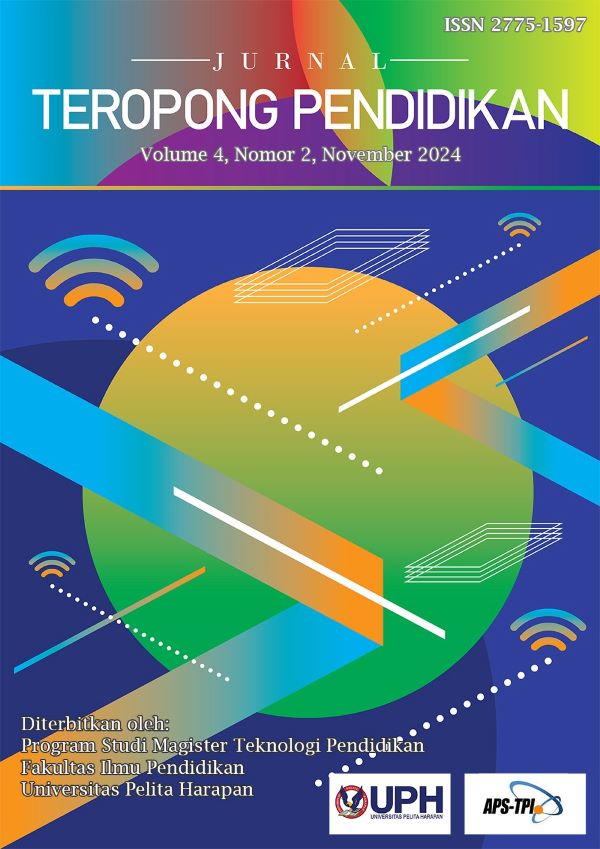Pentingnya Mentor Sebagai Pemimpin Penggembala Pada Kelompok Guru [The Importance of a Mentor as a Shepherd Leader in a Group of Teachers]
DOI:
https://doi.org/10.19166/jtp.v4i2.5707Keywords:
Mentoring, Professional Development, Shepherd Leader, Small Group, Life FormationAbstract
XYZ School is a Christian school in Manado that has implemented teacher mentoring program since the school was established. Changes in the implementation of mentoring programs that were designed in structured way created anxiety for leaders who had to become mentors about their leadership ability to focus not only on professional development, but also on shepherding role. This research aims to determine how deep the role of mentor as shepherd leader is in professional development, identify challenges faced by mentor and how to overcome it, and identify the impact of mentor’s role as shepherd leader on the process of forming mentee’s life formation. This study uses qualitative approach with an exploratory case study design. Determination of informants is done by purposive and snowball sampling as many as fourteen informants. The research showed that mentors are a shepherding leader in professional development through various intentional activities in mentoring meetings. Mentor struggles with challenges from within. In facing challenges, mentor experiences life changes and growth, then processed in response to God's calling. The small group context builds deep relationships that helps mentor to know, feed, lead, and to be a role model. Mentor’s life changes and deep relationships have influenced mentee and inspired process of forming their life formation
References
Anggito, A., & Setiawan, J. (2018). Metodologi penelitian kualitatif. Sukabumi, Indonesia: Jejak Publisher.
Brewer, A. M. (2016). Mentoring from a positive psychology perspective. Cham, Switzeland: Springer International Publishing.
Brummelen, H. V. (2009). Walking with God in the Classroom: Christian approach to teaching and learning (3rd Ed.). Colorado Springs, CO: Purposeful Design Publication.
Creswell, J. W. (2015). Penelitian kualitatif & desain riset. Yogyakarta, Indonesia: Pustaka Belajar.
Donahue, B., & Bowman, G. (2006). Coaching life-changing small group leaders. Grand Rapids, MI: Zondervan.
Ferriss, T. (2017). Tribe of mentors: Short life advice from the best in the world. New York, NY: Houghton Mifflin Harcourt Publishing Company.
Fujishin, R. (2013). Creating effective groups: The art of small group communication (3rd Ed.). London, England: Rowman & Littlefield Publisher.
Graham, D. L. (2009). Teaching redemptively (2nd Ed.). Colorado Springs, CO: Purposeful Design Publication.
Hammond, L. D., Hyler, M. E., & Gardner, M. (2017). Effective teacher professional development. Learning Policy Institute.
Hobson, A. J., Ashby, P., Malderez, A., & Tomlinson, P. D. (2009). Mentoring beginning teachers: What we know and what we don’t. Teaching and Teacher Education, 25(1), 207–216. http://dx.doi.org/10.1016/j.tate.2008.09.001.
Knight, G. R. (2009). Filsafat dan pendidikan: Sebuah pendahuluan dari perspektif kristen. Jakarta, Indonesia: Universitas Pelita Harapan.
Lo, J. W. (2018). Pemuridan intensional dalam gereja tradisional. Karawaci, Indonesia: UPH Press.
Mamik, M. (2015). Metode kualitatif. Sidoarjo, Indonesia: Zifatama Publisher.
Mathews, P. (2003). Academic mentoring: Enhancing the use of scarce resources. Educational Management & Administration, 31(3), 313–334. https://doi.org/10.1177/0263211X03031003007
Sowell, M. (2017). Effective practices for mentoring beginning middle school teachers: Mentor’s perspectives. The Clearing House: A Journal of Educational Strategies, 90(4), 129–134. https://doi.org/10.1080/00098655.2017.1321905
Stanley, P. D., & Clinton, J. R. (2004). Mentor: Anda perlu mentor dan bersedia menjadi mentor. Jawa Timur, Indonesia: Gandum Mas.
Stewart, C. (2014). Transforming professional development to professional learning. Journal of Adult Education, 43(1), 28–33. https://eric.ed.gov/?id=EJ1047338.
Susabda, Y. B. (2020). Pastoral konseling II. Malang, Indonesia: Gandum Mas.
Suwendra, I. W. (2018). Metode penelitian kualitatif dalam ilmu sosial, pendidikan, kebudayaan, dan keagamaan. In B. A. L. Manuaba (Eds.), Metode penelitian kualitatif (pp. 1–28). Bandung, Indonesia: Nilacakra.
Witmer, T. Z. (2010). The shepherd leader: Achieving effective spherding in your church. New Jersey, NY: P&R Publishing Company.
Downloads
Published
Issue
Section
License
Copyright (c) 2025 Elisabet Dewi Rumanti

This work is licensed under a Creative Commons Attribution-ShareAlike 4.0 International License.
Authors who publish with this journal agree to the following terms:
1) Authors retain copyright and grant the journal right of first publication with the work simultaneously licensed under a Creative Commons Attribution License (CC-BY-SA 4.0) that allows others to share the work with an acknowledgement of the work's authorship and initial publication in this journal.
2) Authors are able to enter into separate, additional contractual arrangements for the non-exclusive distribution of the journal's published version of the work (e.g., post it to an institutional repository or publish it in a book), with an acknowledgement of its initial publication in this journal.
3) Authors are permitted and encouraged to post their work online (e.g., in institutional repositories or on their website). The final published PDF should be used and bibliographic details that credit the publication in this journal should be included.







